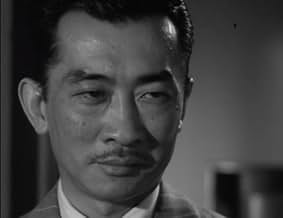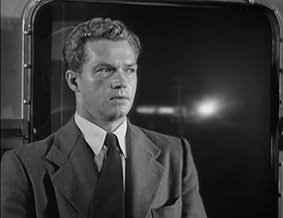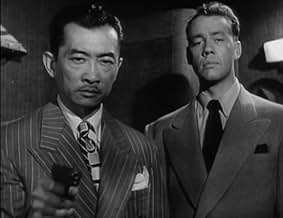Jim Fletcher, al risveglio da un coma, scopre che sarà processato alla corte marziale per tradimento e accusato di essere un informatore nemico in un campo di prigionia giapponese durante la... Leggi tuttoJim Fletcher, al risveglio da un coma, scopre che sarà processato alla corte marziale per tradimento e accusato di essere un informatore nemico in un campo di prigionia giapponese durante la seconda guerra mondiale.Jim Fletcher, al risveglio da un coma, scopre che sarà processato alla corte marziale per tradimento e accusato di essere un informatore nemico in un campo di prigionia giapponese durante la seconda guerra mondiale.
- Regia
- Sceneggiatura
- Star
- Helen Minoto
- (as Mary Marco)
- Hotel Manager
- (non citato nei titoli originali)
- Doctor
- (non citato nei titoli originali)
- Abbott
- (non citato nei titoli originali)
- Chief Jones
- (non citato nei titoli originali)
- Train Passenger
- (non citato nei titoli originali)
Recensioni in evidenza
Unfortunately, a compromised script prevents the promising start from reaching front rank. Paradoxically, the screenplay is from ace writer Carl Foreman (High Noon; Bridge on the River Kwai, et al). I can only surmise that the brief running time (63-minutes) and a tight B-movie shooting schedule forced him to compromise the narrative in implausible fashion. For example—Hale's quick turnaround with escaped fugitive Williams, especially when she thinks he's responsible for her husband's death; the chance encounter with Japanese ex-prison guard Richard Loo; the cops unexplained boarding of the train in the middle of nowhere when they planned to wait in Glendale; but most of all, the angelic mother who allows a fugitive stranger she's just let in the door to hide in the same room as her infant son.
These devices may expedite the plot, but they also come across as just that, plot devices-- too many, in my view, for what is also a pretty dense narrative. At the same time, guessing the mystery's real culprit becomes pretty easy, thereby undermining the suspense. Also, director Fleischer shows little of the personal engagement that distinguishes his other noirs. All in all, the movie adds up to an average programmer that unfortunately promises more than it delivers.
There are several movies of the period which start with a war veteran who wakes up in an army or navy hospital with amnesia. In this case, the young man does know who he is and where he was, but he has no idea why he is accused of treason. Everybody in the hospital lets him feel that he should be hanged after he gets well. The strong and scary opening sequence has him sleeping as hands stretch out for his face from outside the frame, fingering it tentatively while he opens his eyes in astonishment, then sliding down to his throat in an attempt to strangle him before a nurse intervenes. They belong to a blinded veteran who wants to know how a traitor looks like".
The accused escapes from the hospital and tries to find out what it is all about, aided by the widowed wife of a war buddy (strong performance by Barbara Hale). He finds out that the alleged treason refers to his time as a POW in a Japanese camp; he is said to have ratted on other prisoners who stole food rations, just in order not to starve. He also remembers being beaten savagely by a sadistic Japanese warden called the Weasel. A whole landscape of scars on his chest tell from this ordeal. But now you're as strong as an ox again", the woman who helps him says encouragingly, and just as dumb", he adds.
The search directs the couple to L.A.'s Chinatown, and much of that part of the movie was filmed on location. To his surprise the veteran spots the Weasel who is already well established within the local gangland. The movie then builds up to a dramatic finale on a train with a much better set design than in Fleischer's Narrow Margin and a happy ending.
As the title suggests, The Clay Pigeon is a full fledged film noir. The movie has a very good script (although it sometimes stretches credibility) and a surprisingly rich imagery (night scenes on roads and in towns, a trailer beach colony, different locations in downtown L.A., including Chinatown). I suppose its message is above the ordinary political (the GI who waits for his court martial while a real" former war criminal is alive and well and living in California, the veteran's open distrust of the institutions the hints of a connection between the openly criminal world and the serious" business community as shown after the veteran's visit in a real estate agency).
It seems The Clay Pigeon is a film that waits to be rediscovered. It stands its own in the genre (and is not even mentioned in the Silver/Ward Film Noir Encyclopedia). I can recommend it.
Jim Fletcher (Bill Williams) awakens in a military hospital and has no recollection of his recent past. One moment he was a prisoner of war in a hellish Japanese camp, the next he's in a hospital bed and quite a bit of time has passed. But the real serious issue here is that he's going to be court martialed for treason....and he can't recall having done anything wrong. So, he does what people like this always do in other films...he escapes in order to investigate and find out what really did happen. Along the way, he picks up a lady and she's his unwilling partner. Later, she realizes something IS going on and she helps him in his quest.
While I've seen quite a few similar sorts of films, this one is better than most. Despite being a B-movie and having lesser stars, it's well written and doesn't look cheap. In fact, it's well made from start to finish...and quite enjoyable.
"The Clay Pigeon" is a film-noir based on a true story despite the flawed but pleasant and tense screenplay. The coincidences and the happy ending make the story hard to believe. The chemistry of Bill Williams and Barbara Hale is fantastic and the resemblance of Bill Williams with his son William Katt is amazing. My vote is seven.
Title (Brazil): "Alma em Sombras" ("Soul in Shadows")
Lo sapevi?
- QuizThis film is based on a true story of a U.S. serviceman recognizing his former sadistic Japanese POW camp guard on a street in Los Angeles. The guard, who had been born in the US, and therefore was an American citizen, had moved to Japan before the war and returned to the US afterwards. He was convicted of treason.
- BlooperWhen the train is shown leaving Los Angeles with "The Weasel" on board, it has a Pennsylvania Railroad logo on the nose of the locomotive. The Pennsylvania did not serve the west coast - this was obviously stock footage.
- Citazioni
Mrs. Helen Minoto: Have they gone?
Jim Fletcher: They've left the building, but they may be back.
Mrs. Helen Minoto: You'd better wait a few minutes.
Jim Fletcher: I owe you an apology... Why did you help me?
Mrs. Helen Minoto: You said you were in trouble. I knew they weren't the police.
Jim Fletcher: I'm sorry I had to upset Johnny.
Mrs. Helen Minoto: Oh? He'll go to sleep now. He's a good boy. He's just like his father.
Jim Fletcher: The 442nd was quite an outfit.
Mrs. Helen Minoto: Yes, it was.
- ConnessioniFeatured in Noir Alley: The Clay Pigeon (2018)
I più visti
- How long is The Clay Pigeon?Powered by Alexa
Dettagli
- Tempo di esecuzione1 ora 3 minuti
- Colore
- Proporzioni
- 1.37 : 1
Contribuisci a questa pagina




































